 Libri di Zygmunt Bauman su Unilibro.it
)
Libri di Zygmunt Bauman su Unilibro.it
)
|
|
2006 |
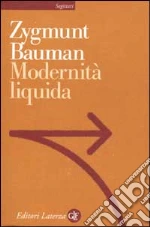 Title :
Modernità liquida
Title :
Modernità liquidaAuthor: Bauman Zygmunt Publisher: Laterza 'Abbandonate ogni speranza di totalità, futura come passata, voi che entrate nel mondo della modernità liquida...': una metafora per descrivere la fase attuale della nostra modernità che suona a epitaffio di un modo stabilizzato e rassicurante di sentirsi nel mondo. € 18,00
|
 Title :
Vita liquida
Title :
Vita liquidaAuthor: Bauman Zygmunt Publisher: Laterza Stress, consumismo ossessivo, paura sociale e individuale, città alienanti, legami fragili e mutevoli: il mondo in cui viviamo sfoggia una fisionomia sempre più effimera e incerta. È 'liquido'. 'Una società può essere definita 'liquido-moderna' se le situazioni in cui agiscono gli uomini si modificano prima che i loro modi di agire riescano a consolidarsi in abitudini e procedure. La vita liquida, come la società liquida, non è in grado di conservare la propria forma o di tenersi in rotta a lungo.' Sospinta dall'orrore della scadenza la società liquida deve modernizzarsi, o soccombere. E chi la abita deve correre con tutte le proprie forze per restare nella stessa posizione. € 15,00
|
 Title :
L'Europa è un'avventura
Title :
L'Europa è un'avventuraAuthor: Bauman Zygmunt Publisher: Laterza Secondo Bauman, a differenza del passato illustre del continente, oggi l'Europa sembra aver perso la sicurezza in se stessa e il gusto dell'avventura. Presa nelle spire di un mondo che si trasforma, comincia a guardare agli altri con diffidenza e paura, si chiude agli immigrati, affoga nella povertà della sua fantasia, nella limitatezza delle sue risorse e non ha più volontà sufficiente per seguire le sue inclinazioni. Eppure mai prima d'ora questo pianeta ha avuto bisogno di un'Europa disposta a guardare oltre le proprie frontiere. Di un'Europa che può giocare un ruolo vitale a patto di ritrovare la sua identità e condividere quell'esperienza di libertà, democrazia e giustizia che ha appreso duramente lungo il suo percorso tortuoso. € 15,00
|
|
2005 |
 Title :
Liquid Life
Title :
Liquid LifeAuthor: Bauman Zygmunt Publisher: Polity Pr 'Liquid life' is the kind of life commonly lived in our contemporary, liquid-modern society. Liquid life cannot stay on course, as liquid-modern society cannot keep its shape for long. Liquid life is a precarious life, lived under conditions of constant uncertainty. The most acute and stubborn worries that haunt this liquid life are the fears of being caught napping, of failing to catch up with fast moving events, of overlooking the 'use by' dates and being saddled with worthless possessions, of missing the moment calling for a change of tack and being left behind. Liquid life is also shot through by a contradiction: it ought to be a (possibly unending) series of new beginnings, yet precisely for that reason it is full of worries about swift and painless endings, without which new beginnings would be unthinkable. Among the arts of liquid-modern living and the skills needed to practice them, getting rid of things takes precedence over their acquisition. This and other challenges of life in a liquid-modern society are traced and unravelled in the successive chapters of this new book by one of the most brilliant and original social thinkers of our time. € 22,40
|
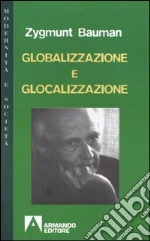 Title :
Globalizzazione e glocalizzazione
Title :
Globalizzazione e glocalizzazioneAuthor: Bauman Zygmunt Publisher: Armando Editore Zygmunt Bauman, collocato tra i più importanti sociologi europei della seconda metà del Novecento, è pressoché onnipresente nella teoria sociale contemporanea e sostanzialmente al centro delle tendenze e controversie che animano la discussione sulla modernità. Questo volume è una raccolta di alcuni degli scritti più rappresentativi del pensiero di Bauman. La selezione dei brani copre un'ampia gamma di temi affrontati dal sociologo nelle sue opere: si va dal socialismo e marxismo moderno alla sociologia del postmoderno e alla globalizzazione. € 24,00
Scontato: € 22,80
|
 Title :
Fiducia e paura nella città
Title :
Fiducia e paura nella cittàAuthor: Bauman Zygmunt Publisher: Mondadori Bruno In questo volume l'autore pone in discussione la vita quotidiana delle persone nella grande città. Un tempo luogo di sviluppo e promozione sociale, e anche di sicurezza, è oggi un 'vaso di Pandora' dal quale zampillano fuori problemi che appaiono difficilmente risolvibili e generano un senso di frustrazione e insicurezza. Le città postmoderne conoscono oggi il fenomeno inverso dell'abbandono di un numero crescente di abitanti, respinti dalle proibitive condizioni materiali e soprattutto da un senso di paura che Bauman descrive lucidamente e impietosamente. € 11,00
Scontato: € 10,45
|
 Title :
Vite di scarto
Title :
Vite di scartoAuthor: Bauman Zygmunt Publisher: Laterza La modernizzazione è la più prolifica e meno controllata linea di produzione' di rifiuti e di esseri umani di scarto. La sua diffusione globale ha sprigionato e messo in moto quantità enormi e sempre crescenti di persone private dei loro modi e mezzi di sopravvivenza. I reietti, i rifugiati, gli sfollati, i richiedenti asilo sono i rifiuti della globalizzazione. Ma non sono i soli rifiuti: vi sono anche le scorie che hanno accompagnato fin dall'inizio la produzione. Zygmunt Bauman è uno dei più noti e influenti pensatori al mondo. Professore emerito di Sociologia nelle Università di Leeds e Varsavia. € 15,00
|
 Title :
Amore liquido. Sulla fragilità dei legami affettivi
Title :
Amore liquido. Sulla fragilità dei legami affettiviAuthor: Bauman Zygmunt Publisher: Laterza 'La solitudine genera insicurezza, ma altrettanto fa la relazione sentimentale. In una relazione, puoi sentirti insicuro quanto saresti senza di essa, o anche peggio. Cambiano solo i nomi che dai alla tua ansia'. I protagonisti di questo libro sono gli uomini e le donne nostri contemporanei, che anelano la sicurezza dell'aggregazione e una mano su cui poter contare nel momento del bisogno. Eppure sono gli stessi che hanno paura di restare impigliati in relazioni stabili e temono che un legame stretto comporti oneri che non vogliono né pensano di poter sopportare. € 16,00
|
|
|
2004 |
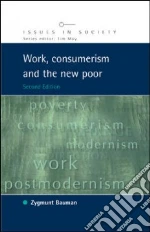 Title :
Work, Consumerism and the New Poor
Title :
Work, Consumerism and the New PoorAuthor: Zygmunt Bauman Publisher: OPEN UNIVERSITY PRESS From one of today's most eminent thinkers--a piercing examination of poverty in the modern age If 'being poor' once derived its meaning from the condition of being unemployed, today it draws its meaning primarily from the plight of a flawed consumer. This distinction truly makes a difference in the way poverty is experienced and in the chances to redeem its misery. This absorbing book traces this change, and makes an inventory of its social consequences. It also considers ways of fighting back advancing poverty and mitigating its hardships, and tackles the problems of poverty in its present form. The new edition features:
Students of sociology, politics, and social policy will find this to be an invaluable text on the changing significance and implications of an enduring social problem. € 34,10
|
 Title :
Identity
Title :
IdentityAuthor: Bauman Zygmunt, Vecchi Benedetto Publisher: Polity Pr This topical new book by Zygmunt Bauman explores the notion of identity in the modern world. As we grapple with the insecurity and uncertainty of liquid modernity, Bauman argues that our socio-political, cultural, professional, religious and sexual identities are undergoing a process of continual transformation. Identities the world over have become more precarious than ever: we live in an era of constant change and disposability - whether it's last season's outfit, or car, or even partner - and our identities as a result have become transient and deeply elusive. In a world of rapid global change where national borders are increasingly eroded, our identities are in a state of continuous flux. Identity - a notion that by its very nature is elusive and ambivalent - has become a key concept for understanding the changing nature of social life and personal experience in our contemporary, liquid modern age. In this brief book, Zygmunt Bauman explains compellingly why this is so. € 17,60
|
 Title :
Wasted Lives
Title :
Wasted LivesAuthor: Bauman Zygmunt Publisher: Polity Pr The production of 'human waste' - or more precisely, wasted lives, the 'superfluous' populations of migrants, refugees and other outcasts - is an inevitable outcome of modernization. It is an unavoidable side-effect of economic progress and the quest for order which is characteristic of modernity. As long as large parts of the world remained wholly or partly unaffected by modernization, they were treated by modernizing societies as lands that were able to absorb the excess of population in the 'developed countries'. Global solutions were sought, and temporarily found, to locally produced overpopulation problems. But as modernization has reached the furthest lands of the planet, 'redundant population' is produced everywhere and all localities have to bear the consequences of modernity's global triumph. They are now confronted with the need to seek - in vain, it seems - local solutions to globally produced problems. The global spread of the modernity has given rise to growing quantities of human beings who are deprived of adequate means of survival, but the planet is fast running out of places to put them. Hence the new anxieties about 'immigrants' and 'asylum seekers' and the growing role played by diffuse 'security fears' on the contemporary political agenda. With characteristic brilliance, this new book by Zygmunt Bauman unravels the impact of this transformation on our contemporary culture and politics and shows that the problem of coping with 'human waste' provides a key for understanding some otherwise baffling features of our shared life, from the strategies of global domination to the most intimate aspects of human relationships. € 20,50
|
|
2003 |
 Title :
Liquid Love
Title :
Liquid LoveAuthor: Bauman Zygmunt Publisher: Polity Pr This book is about the central figure of our contemporary, 'liquid modern' times - the man or woman with no bonds, and particularly with none of the fixed or durable bonds that would allow the effort of self-definition and self-assertion to come to a rest. Having no permanent bonds, the denizen of our liquid modern society must tie whatever bonds they can to engage with others, using their own wits, skill and dedication. But none of these bonds are guaranteed to last. Moreover, they must be tied loosely so that they can be untied again, quickly and as effortlessly as possible, when circumstances change - as they surely will in our liquid modern society, over and over again. The uncanny frailty of human bonds, the feeling of insecurity that frailty inspires, and the conflicting desires to tighten the bonds yet keep them loose, are the principal themes of this important new book by Zygmunt Bauman, one of the most original and influential social thinkers of our time. It will be of great interest to students and scholars in sociology and in the social sciences and humanities generally, and it will appeal to anyone interested in the changing nature of human relationships. € 17,90
|
 Title :
Una nuova condizione umana
Title :
Una nuova condizione umanaAuthor: Bauman Zygmunt Publisher: Vita e Pensiero Zygmunt Bauman è uno dei massimi interpreti del nostro tempo. Le sue analisi sulla frammentazione delle identità, sull'incertezza esistenziale, sulla precarietà e la solitudine delle nostre vite hanno oltrepassato i confini disciplinari della sociologia, diventando parte del patrimonio culturale diffuso. In questo volume Bauman introduce a una nuova fase del suo impegno intellettuale, mettendo a tema interrogativi fondamentali che riguardano la condizione umana stessa. Che cos'è dell'essere umano nel nostro contesto storico e quale sarà il suo destino? Domande urgenti dopo lo sfaldamento di quel mondo solido, forte, istituito, ordinato, che abbiamo conosciuto sotto il nome di modernità, e al quale, negli ultimi decenni, soprattutto in forza della globalizzazione, è subentrato un universo 'liquido', destrutturato, precario, privo di riferimenti stabili. La mutazione di scenario ha inciso profondamente sulle esistenze individuali: angoscia, fragilità, perdita di senso sono le cifre dei vissuti più comuni, non solo in Occidente. Il quadro tracciato da Bauman sulla nuova condizione umana appare tanto più inquietante se si considerano anche i risvolti materiali di questo processo: disuguaglianze e povertà crescenti, diritti umani calpestati, prepotente ritorno di violenza e guerre. Questa critica, risoluta perché lucida e moralmente ispirata, non indulge tuttavia alla nostalgia del passato né alla rassegnazione: ogni epoca ha le sue luci e le sue ombre. € 14,00
Scontato: € 13,30
|
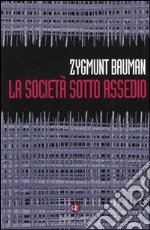 Title :
La società sotto assedio
Title :
La società sotto assedioAuthor: Bauman Zygmunt Publisher: Laterza La società è sotto assedio: le nuove élite organizzate hanno, per riaffermare il dominio del mercato, rotto tutti i legami che la tenevano unita. Sono finiti i partiti politici e sono in crisi le associazioni, sono più deboli i nostri vincoli con la comunità religiosa e perfino i legami matrimoniali e familiari sono più labili. Sedotto dalla pubblicità e da potenti modelli televisivi, l'individuo è solo di fronte al mondo globale. In teoria può collegarsi sempre e dovunque con tutti. In pratica, i suoi contatti sono momentanei, sempre reversibili e mai duraturi. Zygmunt Bauman è professore emerito di Sociologia nelle Università di Leeds e Varsavia e uno dei sociologi più conosciuti a livello internazionale. € 16,00
|
|
2002 |
 Title :
Il disagio della postmodernità
Title :
Il disagio della postmodernitàAuthor: Bauman Zygmunt Publisher: Mondadori Bruno Con questo libro Bauman riassume e precisa le sue teorie sulla natura della postmodernità. Bauman sottolinea che sono le varie facce della modernità/civiltà a causare una sofferenza crescente nell'uomo contemporaneo. La sua teoria vuole essere un'analisi dei fenomeni che hanno trasformato una grande possibilità di progresso in una macchina soffocante che produce solitudine e ingiustizia. € 17,50
|
 Title :
Società, etica, politica, Conversazioni con Zygmunt Bauman
Title :
Società, etica, politica, Conversazioni con Zygmunt BaumanAuthor: Bauman Zygmunt; Tester Keith Publisher: Raffaello Cortina Editore Zygmunt Bauman, una delle figure più rappresentative della sociologia contemporanea, racconta il suo percorso intellettuale, mostrando come le sue analisi della modernità costituiscano la sostanza morale del rifiuto di accettare che il mondo non possa essere cambiato. Nel solco classico degli studiosi interessati agli effetti sociali e culturali della modernizzazione, Bauman rivolge ai fenomeni 'globalizzanti' legati alle trasformazioni sociali, politiche ed economiche degli ultimi anni uno sguardo sociologico orientato più alla comprensione che all'analisi quantitativa, come invece vorrebbe la moda economicistica. € 16,00
Scontato: € 15,20
|
 Title :
La società individualizzata. Come cambia la nostra esperienza
Title :
La società individualizzata. Come cambia la nostra esperienzaAuthor: Bauman Zygmunt Publisher: Il Mulino Le società in cui viviamo sono sempre più caratterizzate da apatia politica, declino dell'uomo pubblico, ricerca affannosa di comunità, scomparsa della vecchia arte di costruire e mantenere legami sociali, paura dell'abbandono, culto disperato del corpo. Zygmunt Bauman, sociologo, in questo libro si interroga sul fenomeno della progressiva individualizzazione della società contemporanea e sui sentimenti di paura che ne derivano per i singoli. € 17,00
|
|
2001 |
 Title :
Community
Title :
CommunityAuthor: Bauman Zygmunt Publisher: Polity Pr 'Community' is one of those words that feels good: it is good 'to have a community', 'to be in a community'. And 'community' feels good because of the meanings which the word conveys, all of them promising pleasures, and more often than not the kind of pleasures which we would like to experience but seem to miss. 'Community' conveys the image of a warm and comfortable place, like a fireplace at which we warm our hands on a frosty day. Out there, in the street, all sorts of dangers lie in ambush; in here, in the community, we can relax and feel safe. 'Community' stands for the kind of world which we long to inhabit but which is not, regrettably, available to us. Today 'community' is another name for paradise lost - but for a paradise which we still hope to find, as we feverishly search for the roads that may lead us there. But there is a price to be paid for the privilege of being in a community. Community promises security but seems to deprive us of freedom, of the right to be ourselves. Security and freedom are two equally precious and coveted values which could be balanced to some degree, but hardly ever fully reconciled. The tension between security and freedom, and between community and individuality, is unlikely ever to be resolved. We cannot escape the dilemma but we can take stock of the opportunities and the dangers, and at least try to avoid repeating past errors. In this important new book, Zygmunt Bauman takes stock of these opportunities and dangers and, in his distinctive and brilliant fashion, offers a much-needed reappraisal of a concept that has become central to current debates about the nature and future of our societies. € 18,80
|
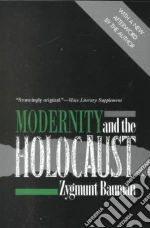 Title :
Modernity and the Holocaust
Title :
Modernity and the HolocaustAuthor: Bauman Zygmunt, Bauman Zygmunt (AFT) Publisher: Cornell Univ Pr A new afterword to this edition, 'The Duty to Remember—But What?' tackles difficult issues of guilt and innocence on the individual and societal levels. Zygmunt Bauman explores the silences found in debates about the Holocaust, and asks what the historical facts of the Holocaust tell us about the hidden capacities of present-day life. He finds great danger in such phenomena as the seductiveness of martyrdom; going to extremes in the name of safety; the insidious effects of tragic memory; and efficient, 'scientific' implementation of the death penalty. Bauman writes, 'Once the problem of the guilt of the Holocaust perpetrators has been by and large settled . . . the one big remaining question is the innocence of all the rest—not the least the innocence of ourselves.'Among the conditions that made the mass extermination of the Holocaust possible, according to Bauman, the most decisive factor was modernity itself. Bauman's provocative interpretation counters the tendency to reduce the Holocaust to an episode in Jewish history, or to one that cannot be repeated in the West precisely because of the progressive triumph of modern civilization. He demonstrates, rather, that we must understand the events of the Holocaust as deeply rooted in the very nature of modern society and in the central categories of modern social thought. € 24,30
|
 Title :
Voglia di comunità
Title :
Voglia di comunitàAuthor: Bauman Zygmunt Publisher: Laterza La comunità ci manca perché ci manca la sicurezza, elemento fondamentale per una vita felice, ma che il mondo di oggi è sempre meno in grado di offrirci e sempre più riluttante a promettere. Ma la comunità resta pervicacemente assente, ci sfugge costantemente di mano o continua a disintegrarsi, perché la direzione in cui questo mondo ci sospinge nel tentativo di realizzare il nostro sogno di una vita sicura non ci avvicina affatto a tale meta; anziché mitigarsi, la nostra insicurezza aumenta di giorno in giorno, e così continuiamo a sognare, a tentare e a fallire. Ma se riuscissimo a realizzare una collettività amica, la comunità richiederebbe una lealtà incondizionata e noi perderemmo libertà e autonomia. E' il dilemma affrontato da questo saggio. € 12,39
|
|
2000 |
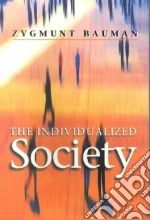 Title :
Individualized Society
Title :
Individualized SocietyAuthor: Zygmunt Bauman Publisher: BLACKWELL PUBLISHERS We are spurred into action by our troubles and fears; but all too often our action fails to address the true causes of our worries. When trying to make sense of our lives, we tend to blame our own failings and weaknesses for our discomforts and defeats. And in doing so, we make things worse rather than better. Reasonable beings that we are, how does this happen and why does it go on happening? These are the questions addressed in this new book by Zygmunt Bauman - one of the most original and perceptive social thinkers writing today. For Bauman, the task of sociology is not to censor or correct the stories we tell of our lives, but to show that there are more ways in which our life stories can be told. By bringing into view the many complex dependencies invisible from the vantage point of private experience, sociology can help us to link our individual decisions and actions to the deeper causes of our troubles and fears - to the ways we live, to the conditions under which we act, to the socially drawn limits of our imagination and ambition. Sociology can help us to understand the processes that have shaped the society in which we live today, a society in which individualization has become our fate. And sociology can also help us to see that if our individual but shared anxieties are to be effectively tackled, they need to be addressed collectively, true to their social, not individual, nature. The Individualized Society will be of great interest to students of sociology, politics and the social sciences and humanities generally. It will also appeal to a broader range of readers who are interested in the changing nature of our social and political life today. € 22,30
|
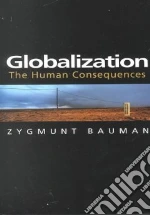 Title :
Globalization
Title :
GlobalizationAuthor: Bauman Zygmunt Publisher: Columbia Univ Pr The word 'globalization' is used to convey the hope and determination of order-making on a worldwide scale. It is trumpeted as providing more mobility -- of people, capital, and information -- and as being equally beneficial for everyone. With recent technological developments -- most notably the Internet -- globalization seems to be the fate of the world. But no one seems to be in control. As noted sociologist Zygmunt Bauman shows in this detailed history of globalization, while human affairs now take place on a global scale, we are not able to direct events; we can only watch as boundaries, institutions, and loyalties shift in rapid and unpredictable ways. Who benefits from the new globalization? Are people in need assisted more quickly and efficiently? Or are the poor worse off than ever before? Will a globalized economy shift jobs away from traditional areas, destroying time-honored national industries? Who will enjoy access to jobs in the new hierarchy of mobility? From the way the global economy creates a class of absentee landlords to current prison designs for the criminalized underclass, Bauman dissects globalization in all its manifestations: its effects on the economy, politics, social structures, and even our perceptions of time and space. In a chilling analysis, Bauman argues that globalization divides as much as it unites, creating an ever-widening gulf between the haves and the have-nots. Rather than the hybrid culture we had hoped for, globalization is creating a more homogenous world. Drawing on the works of philosophers, social historians, architects, and theoreticians such as Michel Foucault, Claude Lévi-Strauss, Alfred J. Dunlap, and Le Corbusier, Globalization presents a historical overview of the methods employed to create and define human spaces and institutions, from rural villages to sprawling urban centers. Bauman shows how the advent of the computer translates into the decline of truly public space. And he explores the dimensions of a world in which -- through new technologies -- time is accelerated and space is compressed, revealing how we have arrived at our current state of global thinking. Bauman's incisive methods of inquiry make Globalization an excellent antidote to the exuberance expressed by those who stand to benefit from the new pace and mobility of the modern life. € 27,60
|
 Title :
Liquid Modernity
Title :
Liquid ModernityAuthor: Bauman Zygmunt Publisher: Polity Pr In this new book, Bauman examines how we have moved away from a 'heavy' and 'solid', hardware-focused modernity to a 'light' and 'liquid', software-based modernity. This passage, he argues, has brought profound change to all aspects of the human condition. The new remoteness and un-reachability of global systemic structure coupled with the unstructured and under-defined, fluid state of the immediate setting of life-politics and human togetherness, call for the rethinking of the concepts and cognitive frames used to narrate human individual experience and their joint history. This book is dedicated to this task. Bauman selects five of the basic concepts which have served to make sense of shared human life - emancipation, individuality, time/space, work and community - and traces their successive incarnations and changes of meaning. Liquid Modernity concludes the analysis undertaken in Bauman's two previous books Globalization: The Human Consequences and In Search of Politics. Together these volumes form a brilliant analysis of the changing conditions of social and political life by one of the most original thinkers writing today. € 24,30
|
 Title :
Liquid Modernity
Title :
Liquid ModernityAuthor: Bauman Zygmunt Publisher: Polity Pr € 67,80
|
 Title :
La cultura come prassi
Title :
La cultura come prassiAuthor: Bauman Zygmunt Publisher: Editori Riuniti € 12,91
|
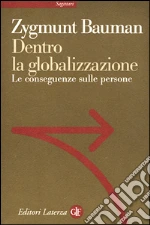 Title :
Dentro la globalizzazione. Le conseguenze sulle persone
Title :
Dentro la globalizzazione. Le conseguenze sulle personeAuthor: Bauman Zygmunt Publisher: Laterza La parola 'globalizzazione' è sulla bocca di tutti. Per alcuni vuol dire ciò che siamo costretti a fare per ottenere la felicità, per altri è la causa stessa dell'infelicità. Per tutti, comunque, significa l'ineluttabile destino del mondo, un processo irreversibile che coinvolge tutti alla stessa misura e allo stesso modo. L'intento di questo volume è quello di provare a dimostrare che il fenomeno della globalizzazione presenta molti più aspetti di quanto non si pensi, mettendone in luce le varie conseguenze di ordine sociale, per tentare così di diradare parte della nebbia che avvolge un termine che pretende di fare chiarezza sulla condizione umana dei nostri giorni. € 12,39
|
|
1999 |
 Title :
In Search of Politics
Title :
In Search of PoliticsAuthor: Bauman Zygmunt Publisher: Stanford Univ Pr In this book, the noted sociologist confronts the decline of the public realm and the profound contradictions of freedom in present-day society. How can most of us consider ourselves free and yet believe equally firmly that there is little we can change?singly, severally, or all together?in the ways the affairs of the world are being run? Why has the growth of individual freedom coincided with the growth of collective impotence, insofar as there is no easy and obvious way to translate private worries into public issues and, conversely, to pinpoint public issues in private troubles? What, under these circumstances, can bring us together? Occasionally, our impulses toward sociality are released in short-lived explosions, sometimes in carnivals of compassion and charity, sometimes by outbursts of beefed-up aggression against a freshly discovered enemy. The trouble with these occasions is that they run out of steam quickly, and when we return to our daily business the shared world, brightly illuminated for a moment, seems if anything darker than before. The chance of changing this condition hangs on the agora?the space neither private nor public, but more exactly private and public at the same time. In this space, private problems meet in a meaningful way?not just to draw narcissistic pleasures or in search of some therapy through public display, but to seek collective levers powerful enough to lift individuals from their private miseries and create ?public good,” a ?just society,” or ?shared values.” The trouble is that little is left today of the old-style private/public spaces. In this book, the author both explores these problems and sketches the outlines of a solution for them. We cannot, he argues, overcome our collective impotence without resorting to politics and using the vehicle of political agency. In the latter part of the book, the author focuses on three orientation points for a reconstruction of politics: the republican model of the state and of citizenship, basic income as a universal entitlement, and an attempt to re-enable the institutions of autonomous society by catching up with the extraterritorial powers wielding control in an age of globalization. € 22,30
|
 Title :
Modernità e olocausto
Title :
Modernità e olocaustoAuthor: Bauman Zygmunt Publisher: Il Mulino € 14,80
|
 Title :
La società dell'incertezza
Title :
La società dell'incertezzaAuthor: Bauman Zygmunt Publisher: Il Mulino Con lo spirito del patologo chino al suo lavoro, Bauman ci mostra una società che respinge la stabilità e la durata, preferisce l'apparenza alla sostanza, sceglie come parola chiave 'riciclaggio' e come 'medium' per eccellenza il videotape ; una società dove il tempo si frammenta in episodi, la salute diventa 'Fitness', la massima espressione di libertà è lo 'zapping'. Dalle macerie del vecchio ordine politico bipolare sembra emergere solo un nuovo disordine mondiale, mentre l'economia invoca e ottiene la deregulation universale. Le figure emblematiche che abitano questo traballante universo sono il giocatore e il turista. Ma forse più di ogni altro lo straniero. € 13,00
|
|
1998 |
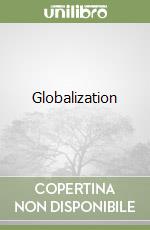 Title :
Globalization
Title :
GlobalizationAuthor: Zygmunt Bauman Publisher: Blackwell publishers Contribution to the current debates on globalization, which attempts to show that there is far more to globalization than is generally acknowledged. Of interest to students of sociology, human geography and cultural studies. € 15,30
|
|

|

|

|

|